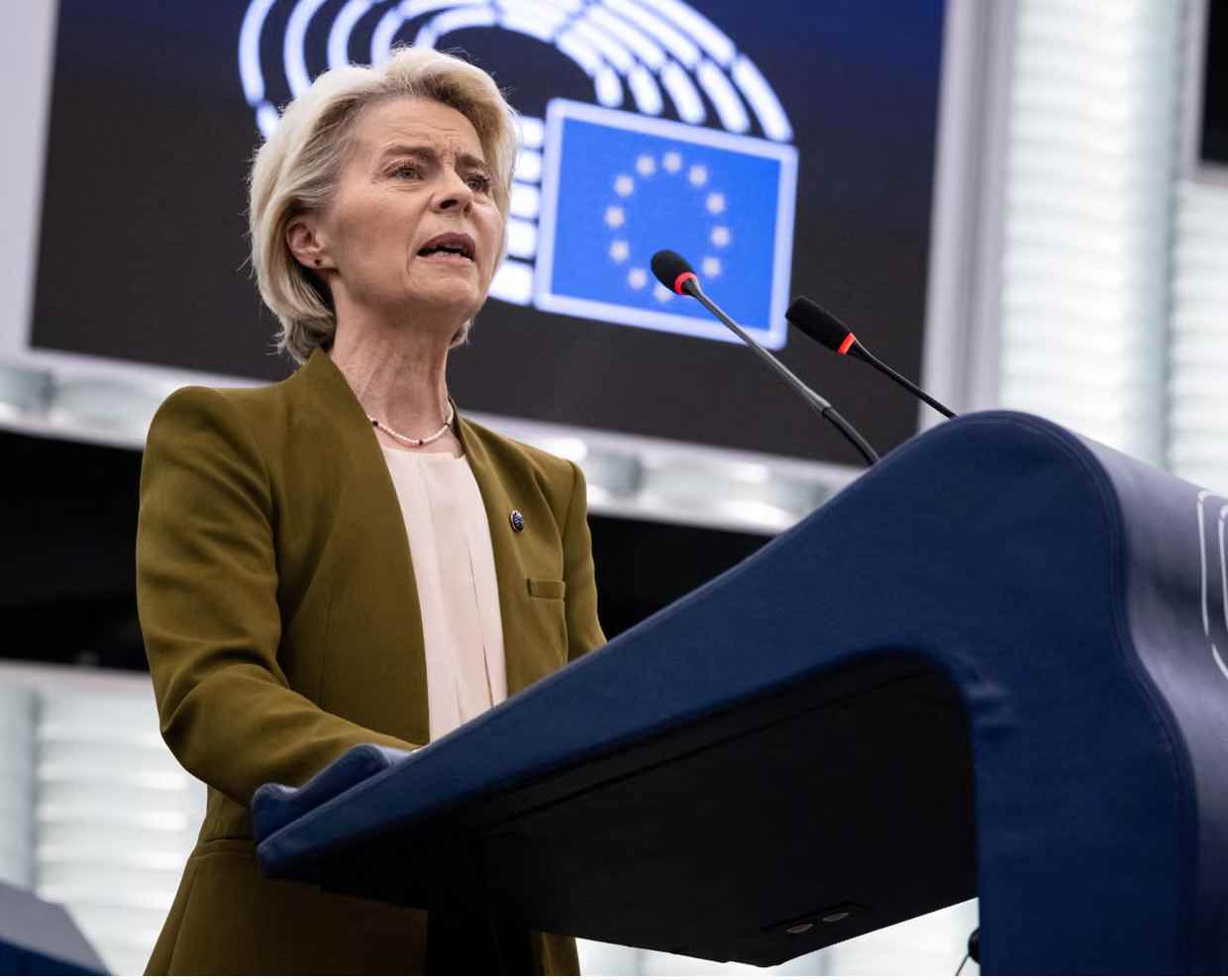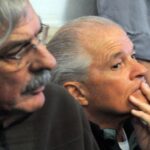
President of the Commission cites illegal settlement plans in the West Bank, Gaza and attempts to “undermine the solution of two states”
The president of the European Commission, Ursula von der Leyen, called for the suspension of free trade with Israel, speaking of Europe’s “painful” disability of responding to war in Gaza and the consequent humanitarian disaster.
In his most extensive condemnation so far of the Israeli government, von der Leyen has criticized plans for illegal settlements that would divide the busy Sommonium, as well as the incitement to violence by extremist Israeli ministers, as a “clear attempt to undermine the solution of two states.”
She made the comments during her annual speech about the “state of the Union” in the European Parliament in Strasbourg, in which she described a turbulent world where battle lines “are being outlined” and “premises are relentlessly turned into weapons.”
She did not refer to the unprecedented attacks of Israel to Qatar, but these events were also in her mind as she spoke of the “endless spiral of events” in a “relentless” world.
In response to Russia’s nightly air space violations, she said Europe “keeps total solidarity with Poland,” a sentence that led European parliamentarians to applaud standing in support. Von der Leyen continued, asking Europe to exert more pressure on Russian President Vladimir Putin to feel at the negotiating table.
It was a bliced speech after a troubled summer when Von der Leyen received harsh criticism from the EU approach to the humanitarian catastrophe in Gaza as well as his criticized trade agreement with Donald Trump. Meanwhile, forest fires, intensified by the climate crisis, consumed European lands equivalent to one third of Belgium size.
Describing Europe’s inability to reach an agreement on a response to Gaza as painful, von der Leyen stated that the EU executive would freeze his bilateral support to Israel, except for funds for civil society groups and the Yad Vashem Holocaust Memorial Center. The commission would also submit proposals to suspend the commercial parties of the UE-Israel Association Agreement and draft sanctions against Israeli extremist ministers and violent settlers in the West Bank, he said.
It is still unclear whether the divided EU will find the most necessary to suspend trade, as a less ambitious measure to freeze Israel’s participation in the EU research program remains blocked. The commission had already considered sanctions against two extreme right Israeli ministers, Itamar Ben-Gvir and Bezalel Smotrich, for their incendiary statements against the population of Gaza, but gave up presenting the proposal, fearing that it did not obtain the unanimity necessary.
The EU is Israel’s largest commercial partner, with an annual exchange of goods and services worth € 68 billion (£ 59 billion). The UE-Israel Association Agreement, signed in 2000, created a free trade area and promoted cooperation in research, environmental policy and other areas.
Von der Leyen also reiterated his desire to end the principle of decisions based on consensus governing European foreign policy, saying it was time to “break free from the shackles of unanimity.”
In a comprehensive speech that gestured to the critics on her left, she promised to keep the EU’s climate schedule course, promised a strategy to eradicate poverty in Europe by 2050 and revealed her interest in Australia’s “pioneering” restrictions on social networks for children. She announced that a panel of experts would analyze the best approach to Europe, stating, “Parents, not algorithms, should raise our children.”
The discourse was also a response to his left’s criticism of EU’s inaction in relation to Israel.
The leader of the socialists in the European Parliament, Iratxe García Pérez, greeted the measurements, but said they were “little and too late.” The socialist leader also attacked the EU trade agreement with Donald Trump, presented on the US president’s golf course at the Scottish resort of Turnberry. García Pérez said the trade agreement was “unacceptable” and “an abuse of power,” and that von der Leyen had gone to Scotland to bury “our strategic autonomy under a golf course.”
Greens’ collide Terry Reintke said von der Leyen had offered “a modest change message” that needed to be implemented. “The EU gave a lot of land to Trump with the commercial agreement with the US,” he added.
The far right group Patriotas, the third largest in Parliament, also criticized the agreement. Its French leader Jordan Bardella said, “They told us that Europe would give strength … Even so, Europe gave in to everything.”
Sometimes Von Der Leyen also faced criticism of far-right MEPs, reelected in record numbers in the 2024 European elections, who booed when she spoke of her concern for the decline of vaccination rates and interrupted her when she announced a new European initiative to combat misinformation.
She defended her trade agreement with Trump, stating that a trade war of full right with the US would have led to chaos. “The agreement provides crucial stability in our US relations at a time of severe global insecurity,” she said, arguing that some of the EU competitors were worse with the US.
She called for more sanctions against Russia because of the war in Ukraine and said that with allies, Europe was seeking faster elimination of Russian fossil fuels, suppressing the parallel fleet used to transport Russian oil around the world, as well as actions against countries that help Russia to escape sanctions.
Von der Leyen did not respond directly to news that Trump would have asked the EU to impose 100% rates on India and China in an attempt to force Putin to sit at the negotiating table. Both countries are major Russian oil buyers and house companies that operate as intermediaries, selling western products to Russian buyers, thus avoiding European and American sanctions.
She stated that the EU was urgently working on a “new solution to finance Ukraine’s war effort,” based on about € 300 billion (260 billion) in frozen Russian assets in the West. She suggested the idea of a repair loan to Ukraine, which would leave the Russian assets legally intact.
The EU is harvesting interest on the Russian assets held in the block, but has not reached a total confiscation, fearing harmful repercussions on the eurozone stability.
Originally published by The Guardian on 9/10/2025
By Jennifer Rankin in Strasbourg
Source: https://www.ocafezinho.com/2025/09/11/ursula-von-der-leyen-pede-suspensao-do-livre-comercio-da-ue-com-israel/

